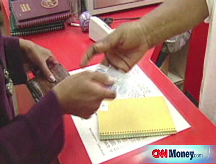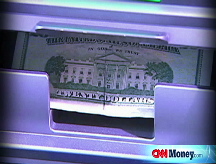Congress pushes for credit card relief
New restrictions on lenders will take effect in 2010, but several in Congress are leading the campaign for faster reform.
(CNNMoney.com) -- With last week's re-introduction in Congress of a bill to rein in what critics say are abusive credit card practices, the stage is set for a Washington battle that will determine whether entrepreneurs and other credit card users get relief soon from soaring rates and fees.
The Credit Cardholders' Bill of Rights was introduced Thursday by Rep. Carolyn Maloney, D-N.Y., in the House, and Senators Mark Udall, D-Colo., and Charles Schumer, D-N.Y., in the Senate. The legislation would take a number of steps to restrict credit card issuers, including:
- Banning retroactive rate increases on existing balances for cardholders in good standing. Rates could still be raised if a customer were more than 30 days late with a payment.
- Requiring 45 days' notice of all rate increases on new charges.
- Banning "double-cycle billing," which allows fees to be charged for balances that were already paid off.
- Allowing cardholders to cap how much they can charge to their cards, to avoid overdraft fees.
- Outlawing "universal default" clauses, which automatically hike rates on a card based on unrelated financial activity, such as being late paying another bill.
"A credit card agreement is supposed to be a contract, but in recent years cardholders have lost the ability to say no to unfair interest rate hikes and fees," Maloney said in a press statement. "This bill levels the playing field between card companies and cardholders while fostering fair competition and free market values."
Many of these same provisions - including the bans on retroactive rate increases and on double-cycle billing - were already put in place in December through new regulations issued by the Federal Reserve and other federal agencies. Those new rules, however, don't take effect until July 2010. Maloney's bill specifies that new regulations would be enacted 90 days after President Obama signs the bill into law.
An earlier version of Maloney's bill passed the House last September, but failed to get out of committee in the Senate. The Schumer/Udall Senate version now goes up against the Credit Card Accountability, Responsibility and Disclosure Act, an even stronger bill sponsored by Senator Chris Dodd, D-Conn., head of the Senate Banking Committee. The Dodd bill would prohibit all retroactive rate increases, regardless of whether cardholders were late with payments, as well as limit what kinds of fees banks may charge their credit card customers.
Credit card companies are expected to oppose the bill. The American Bankers Association, which represents several major credit card companies, says that a 90-day implementation would be too onerous for banks to put into effect.
"In effect, these new regulations completely rework the current credit card system and mark the beginning of a new market structure for credit cards," ABA President Edward Yingling said in a prepared statement.
"Precipitous action, such as the implementation period in the new bill, could have serious and detrimental effects on consumers and the economy at a time when access to credit is in particular demand."
Industry critics don't buy that argument.
"Three months seems like plenty of time to rejigger their computer systems," said Travis Plunkett of the Consumer Federation of America, which backs increased credit card regulation. "There are plenty of ways to allow the banks a reasonable period of time to implement the law without making consumers wait for a year and a half while they're still dealing with practices that the Federal Reserve has determined are unfair and deceptive."
If legislation does make it through Congress, it's almost certain to be signed by Obama, who during his presidential campaign endorsed credit card reform. Obama singled out unilateral rate hikes and rate changes on existing debt as two industry practices in need of abolition.
Despite a packed Congressional calendar, Plunkett says he's hopeful of quick action on credit card legislation.
"Over the years I've been pretty pessimistic about the opportunities for federal legislation, but the prospects are really good," he says. "Members of Congress are hearing from constituents on this issue. Sixty-thousand people wrote the Federal Reserve. This is a very big issue with the American public." ![]()
-
The Cheesecake Factory created smaller portions to survive the downturn. Play
-
A breeder of award-winning marijuana seeds is following the money and heading to the U.S. More
-
Most small businesses die within five years, but Amish businesses have a survival rate north of 90%. More
-
The 10 most popular franchise brands over the past decade -- and their failure rates. More
-
These firms are the last left in America making iconic products now in their twilight. More













